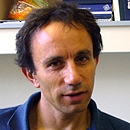Academic Editors
The following people constitute the Editorial Board of Academic Editors for PeerJ. These active academics are the Editors who seek peer reviewers, evaluate their responses, and make editorial decisions on each submission to the journal. Learn more about becoming an Editor.

Syed Mudasir Ahmad
Dr. Syed Mudasir Ahmad is a Professor at the Division of Animal Biotechnology, Faculty of Veterinary Sciences and Animal Husbandry at Sher-e-Kashmir University of Agricultural Sciences and Technology of Kashmir, India. Dr. Mudasir has done his PhD in Biotechnology from Jamia Millia Islamia, New Delhi and Post-doctorate from the university of California, Berkeley USA. He has more than 15 years of research and teaching experience. He is recipient of several national and international awards and fellowships. The areas of his research include Animal genomics and bioinformatics. He has been working on Animal health and production using omics approaches like transcriptomics, proteomics and epigenetics. The main focus of his research is to analyze gene expression across a wide range of different tissues and cell types from multiple developmental stages. He is using mammalian cell models to understand the regulatory mechanisms for gene expression of both coding and noncoding RNAs and their signaling pathways. He is also targeting Stem cells for tissue regeneration in animals. Dr. Mudasir is the author of many books in the field of his research. He is also editorial board member of several reputed journals.

Jeremy P. Loenneke
Dr. Loenneke is the director of the Kevser Ermin Applied Physiology Laboratory and his research group’s primary focus is on skeletal muscle adaptations to exercise with and without the application of blood flow restriction. He is a Fellow of the American College of Sports Medicine and a member of the American Physiological Society.

Mya Breitbart
Professor at the University of South Florida College of Marine Science studying viral and microbial ecology

G Lorimer Moseley
Professor of Clinical Neurosciences & Foundation Chair in Physiotherapy, Director of Innovation in Implementation and Clinical Translation (IIMPACT) Research Collaboration at the University of South Australia; Fellow of the Australian Academy of Health & Medical Science; Hon Fellow, Faculty of Pain Medicine, Australia New Zealand College of Anaesthetists; Fellow, Australian College of Physiotherapists & Honoured Member, Australian Physiotherapy Association; Principal Research Fellow, National Health & Medical Research Council of Australia.

Jingzhe Wang
Jingzhe Wang received his Ph. D in Cartography and Geographic Information System from Xinjiang University, Urumqi, China, in 2019. He is now working as a research associate at MNR Key Laboratory for Geo-Environmental Monitoring of Great Bay Area, Shenzhen University. His research interests focus on Earth observation and remote sensing, spectral modeling, quantitative estimation of soil properties, digital soil mapping, GIS, spatial analysis, and environmental sustainability. He has published over 60 papers in peer-reviewed international journals in these related research areas and has served as a reviewer for many journals and conferences including Remote Sensing of Environment, Ecological Indicators, Computers and Electronics in Agriculture.

Maria Luisa Fernandez-Marcos
Maria Luisa Fernandez-Marcos graduated in Chemical Sciences from the University of Santiago de Compostela (Spain) in 1976. She obtained her PhD in Chemistry from the University of Santiago de Compostela in 1985, specializing in Soil Science. Between 1979 and 1987 she was a secondary school teacher.
Since 1987 she is a professor at the University of Santiago de Compostela, in the area of Soil Science and Agricultural Chemistry, where she has taught Soil Science, Environmental Pollution and related subjects. Her main research lines are: soil chemistry, soil fertility and management, biogeochemical cycles, soil and water pollution, environmental soil science, waste management and recycling, tropical soils, climate change mitigation and adaptation.
She is a member of the Spanish Society of Soil Science, Soil Science Society of America, International Union of Soil Sciences and Ibero-American Society of Environmental Physics and Chemistry.

Nikolay A Poyarkov
I am a herpetologist working on diverse aspects of taxonomy, phylogeny and biodiversity of Asian herpetofauna. I have graduated from the Department of Vertebrate Zoology of Lomonosov Moscow State University and finished my PhD on taxonomy and evolution of Asian salamanders (Hynobiidae) in 2010. Presently I am working in this department as an associate professor. My study is focused on a set of topics on evolutionary biology and taxonomy of Asian amphibians and reptiles, including molecular systematics, phylogeography, DNA-barcoding, distribution and taxonomy of certain groups of Asian herps.

Stephen R Piccolo
He earned a B.S. degree in Management Information Systems from BYU in 2001 and then worked as a software engineer for five years at Intel Corporation in Chandler, Arizona. In 2011, he received a PhD in Biomedical Informatics from the University of Utah (advised by Dr. Lewis J. Frey). From 2011-2014, he was postdoctoral researcher jointly at the University of Utah (Department of Pharmacology and Toxicology, advised by Dr. Andrea H. Bild) and Boston University School of Medicine (Division of Computational Biomedicine, advised by Dr. W. Evan Johnson). He teaches classes in biology and bioinformatics.
The Piccolo lab's overarching goal is to use advanced computational approaches to act on large and complex data sets in an interdisciplinary approach. As such, the lab integrates knowledge and techniques across biology, computer science, medicine, and statistics using "dry lab biology'' to take advantage of massive, publicly available databases.

Richard M Cowling
Professor of Plant Palaeoscience. Foreign Associate of the National Academy of Sciences (USA) and founding member of the Academy of Sciences of South Africa. Former President of the International Society of Mediterranean Ecologists and former Editor-in-Chief of Conservation Letters.

Siouxsie Wiles
Dr Siouxsie Wiles MNZM studied medical microbiology at the University of Edinburgh, followed by a PhD in microbiology at the Centre for Ecology and Hydrology in Oxford and Edinburgh Napier University. She is currently an associate professor at the University of Auckland. There she heads up the Bioluminescent Superbugs Lab where she and her team make nasty bacteria glow in the dark to find new antibiotics and to better understand how bacteria become more infectious. Siouxsie has won numerous awards for both her science and her science communication. In 2017 she published her first book, ‘Antibiotic resistance: the end of modern medicine?’ and in 2019 was appointed a member of the New Zealand Order of Merit for services to microbiology and science communication. When the pandemic arrived, Siouxsie joined forces with Spinoff cartoonist Toby Morris to make the science of COVID-19 clear and understandable. Their award-winning graphics have been translated into multiple languages and adapted by various governments and organisations around the world. Siouxsie was the Supreme Winner of the Stuff Westpac 2020 Women of Influence Award, named by the BBC as one of their 100 influential women of 2020, and in 2021 was named Kiwibank New Zealander of the Year.

Ugo Bastolla
I got my PhD in Physics at Rome University, working with Luca Peliti and Giorgio Parisi on biologically inspired problems: evolutionary models and Boolean networks. Since then, I have always been interested in computational biology: Protein folding, Stability and population biology constraints in protein evolution, Conformation changes in proteins, Structural evolution of proteins, Theoretical ecology, Ecological interactions among microorganisms.

Rodrigo Nunes-da-Fonseca
Associate Professor at the Center for Ecology and Socio-Environmental Development of Macaé, (NUPEM), Federal University of Rio de Janeiro (UFRJ-Macaé). Affiliate Member of the Brazilian Academy of Sciences (2017-2021). Scientist of Our State at FAPERJ (2019-nowadays), PhD (2008) and Postdoctoral studies (2009) in Functional Genomics and Evolutionary Developmental Biology (Evo-Devo) at the University of Cologne, Germany.
Published more than 85 articles in specialized journals with more than 3500 citations (Google Scholar-Fator H = 24). He serves as a reviewer for several international journals (NAR, Cell Reports, Dev. Gen Evol, Dev. Biol, FEBS J, Plos One, Gene, among others) particularly in the evolutionary genetics of arthropod development.

